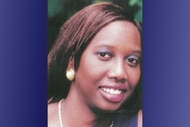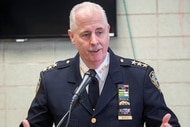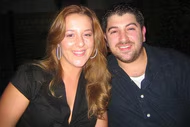What Underhanded Tactics Did One Pharmaceutical Company Use To Convince Doctors To Overprescribe Its Highly Addictive Painkiller?
InSys Therapeutics, led by John Kapoor, paid doctors to prescribe the narcotic Subsys, a form of fentanyl, selling out their patients' health in the process, according to the latest episode of CNBC's "American Greed."

Paul Lara once lived an idyllic life as a shrimp fisherman in Corpus Christie, Texas.
“I bought a big boat, really big beautiful boat and then I was really catching shrimp,” he recalled in a new episode of “American Greed,” airing Monday. “I thought I was going to do that the rest of my life, without a doubt.”
But a freak accident while getting out of his boat one day would change the course of his life forever, leaving him with chronic back pain.
“My pain was excruciating,” Lara said. “I had already had the back surgery and I was still in so much pain.”
Lara sought help for the pain from a local doctor.
But what Lara didn’t know was that the doctor he selected—Dr. Judson Somerville—was financially benefiting from prescribing the dangerous and highly addictive drug Subsys, a form of fentanyl.
Subsys, which was approved by the FDA to treat cancer patients, is said to be 50 to 100 times more powerful than morphine, according to the latest episode of CNBC's “American Greed,” airing Monday at 10 p.m. ET/PT.
Somerville prescribed Lara the highest possible dosage of 1,600 micrograms of the narcotic after his first meeting.
The drug quickly derailed Lara’s life, costing him his job and his ability to function.
“Slowly it started to where I couldn’t find keys, then I couldn’t find my car. I even got lost on my way home to a place that I’ve lived my entire life,” he recalled. “Then I started having hallucinations. I actually was thinking I had like a tumor in my brain or something.”
But while Lara’s life was falling apart, Somerville was raking in the cash as part of an agreement with the pharmaceutical company that makes the drug, Insys Therapeutics.
Prosecutors said the company—led by billionaire John Kapoor—offered to pay doctors a “speaker’s fee” to discuss the benefits of the drug with other doctors.
In many of the conversations, pharmaceutical sales reps often got even more candid, telling the doctors that they weren’t as interested in what the doctor did or didn’t do for the speaker’s fee as long as they were prescribing Subsys, Alec Burlakoff, the former vice president of sales for Insys Therapeutics told “American Greed.”
The more prescriptions were written, the more money the doctor would receive for the speaker's fee, he said.
The agreement translated to high dollar payments for doctors who agreed to the arrangement. In Somerville’s case, he received $123,185 as part of the speaker program in 2013 and wrote 527 prescriptions of Subsys that year, averaging about 10 a week, “American Greed” reports.
“The motives were never to heal him,” Lara’s daughter Ashley Davis said of the care her father received. “The motives were to get a kickback from this company.”
But Somerville wasn’t alone. Insys sales jumped by 1,000 percent as more patients began to take the pain medication.
FBI special agent Vivian Barrios, based in Boston, described Insys Therapeutics sales staff to “American Greed” as “drug pushers in suits.”
“They are drug dealers who go to a business and wear suits and just disguise themselves as if they are doing something different than what they are,” she said.
At the head of the company, prosecutors and investigators believe Kapoor is calling all the shots.
“He is very controlling, unlike other executives we see at that level. He is intimately involved in the details of Insys Therapeutics and there is nothing that happened at the company that wasn’t at his permission or direction,” Barrios said.
But, according to Burlakoff, the success wasn’t enough for Kapoor, who continued to pressure his employees to find new ways to make more money.
“John Kapoor had an obsession — an obsession — with return on investment,” he said. “Everything and anything came down to 'Did we get a return on investment? Yes or no.'”
One obstacle for the company is that Subsys was approved by the FDA for use in cancer patients. While doctors can prescribe “off-label” use, the costly drug often wasn’t approved by insurance companies unless it was for on-label use.
To combat the problem, Insys Therapeutics opened its own call center where Burlakoff said employees would “pose as the doctor’s office” and “do everything in their power” to get the insurance company to pay for the drug, even implying the patient had cancer or describing the problem as “urgent.”
“There bosses were telling them, 'If you can’t get it approved, I’ll find someone who can,'” Assistant U.S. Attorney David Lazarus told “American Greed. “You’ve got to ride the gray line. You’ve got to get these insurance companies to pay. It’s a game. You just have to tell them what they want to hear.”
In just over three years, the operators at the call center were able to fraudulently get approved for an estimated $300 million that was paid out insurance companies and Medicare, according to “American Greed.”
But there were also signs the company—and the doctors who have been prescribing the medication—were in trouble.
In December of 2013, Lara went to get his prescription renewed at Somerville’s office and discovered the doctor’s license had been temporarily revoked after three of his patients overdosed and died.
“The people were standing in the halls and they were angry,” Lara recalled.
No other doctor in the area would agree to treat his patients and Lara was forced to detox from the powerful narcotics cold turkey.
“I thought I was dying when I was taking it. I was on death’s door without it,” he said. “It was like the worst flu you can imagine times 100.”
An increasing number of doctors across the country were also arrested and charged with taking kickbacks from Insys Therapeutics.
Burlakoff found himself in handcuffs in December 2016 after he and five other executives with the company were arrested and indicted on charges of fraud.
The disgraced executive agreed to help prosecutors make a case against Kapoor and while pleading guilty himself to charges of bribing doctors and defrauding health insurers.
“I don’t want to live with those secrets in my mind or in my heart or in my soul any longer. That’s my decision. That’s why I pled guilty,” Burlakoff told “American Greed.” “That’s why I gave up the opportunity to go to trial. I did all of that because I had enough.”
He was sentenced to two years and two months behind bars for his role in the scheme.
Kapoor was arrested in October 2017 for leading a conspiracy to bribe doctors, becoming the first board chairman of a pharmaceutical company to be charged in connection with the opioid crisis.
He was convicted by a federal jury in May 2019 of racketeering conspiracy, according to the U.S. Attorney’s Office. Kapoor received a 66-month prison sentence.
Lara moved on with his life and even testified about his story during Kapoor’s federal trial.
“Everybody thinks I am crazy for saying this, I actually feel sorry for the man,” he told “American Greed.” “This man knew people were dying and just kept on putting that money in his pocket.”
To learn more about Insys Therapeutic’s role in contributing to the opioid epidemic, tune into “American Greed” Monday at 10 p.m. ET/PT on CNBC.


























